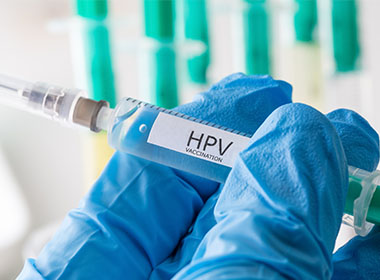Human Papilloma Virus (HPV) and Importance of Vaccination

Human Papilloma Virus – also known as HPV - is the most common sexually transmitted infection. It is so common that nearly all sexually active men and women get it at some point in their lives.
Some types of HPV can cause health problems including genital warts and cancers. But there is a vaccine against HPV.
How do people get HPV?
HPV is a sexually transmitted virus. It can be passed to another person even when an infected person has no signs or symptoms. Anyone who is sexually active can get HPV, even if you have had sex with only one person. You can also develop symptoms years after you have sex with someone who is infected.
How serious is HPV?
In most cases, HPV goes away on its own and there are no health problems. But in some cases it can cause genital warts and cancer. Genital warts usually appear as a small bump or group of bumps in the genital area. Your doctor can diagnose warts with a physical examination.
HPV can cause cancer.
HPV can cause cervical, vaginal, penile, anal and throat cancer. Cancer can take years – sometimes decades to develop from HPV. Right now we don’t know why some people will develop cancer and other health problems while others don’t. But a person with a weak immune system may be less able to fight off HPV than a person with a healthy immune system.
How can someone avoid HPV and the health problems it can cause?
There is an HPV vaccine that protects men and women against diseases, including cancer, when it is caused by HPV. The vaccine is given in three separate shots over six months. It is important to get all of the shots for the maximum protection. Also, you should be screened for cervical cancer. Routine screening for women age 21 to 65 can detect cervical cancer in its early stages. The chance for a better outcome increases when HPV is found early and treated.
Who should get vaccinated for HPV?
The current recommendations are that all boys and girls ages 11 or 12 should be vaccinated. If you’re already past age 12, catch-up vaccines are recommended for males through age 21 and for females through age 26.
Catch-up vaccination is also recommended for men and women with compromised immune systems, including people living with HIV/AIDS, through age 26, who were not fully vaccinated when they were younger.
How do I know if I have HPV?
There is no test for HPV. But there are tests to screen for cervical cancer. These tests are recommended for screening only in women aged 30 years and older. They are not recommended for women under 30. Most people with HPV don’t know they’re infected and never develop symptoms or health problems. Some people find out they have HPV when they get genital warts. Women may find out they have HPV when they get an abnormal Pap test. Others may only find out once they’ve developed more serious problems from HPV, such as cancer.
How common is HPV and the health problems caused by HPV?
About 79 million Americans are currently infected with HPV. About 14 million people become newly infected each year.
What is the treatment for HPV?
There is no treatment for the virus itself. However, there are treatments for the health problems that HPV can cause. Your doctor can treat genital warts. If left untreated, genital warts may go away, stay the same, or grow in size or number.
Cervical pre -cancer can be treated. Women who get routine Pap tests and who follow up as needed can have problems identified before cancer develops. Other HPV-related cancers are also more treatable when diagnosed and treated early.
Learn more
Find a Primary Care Physician
